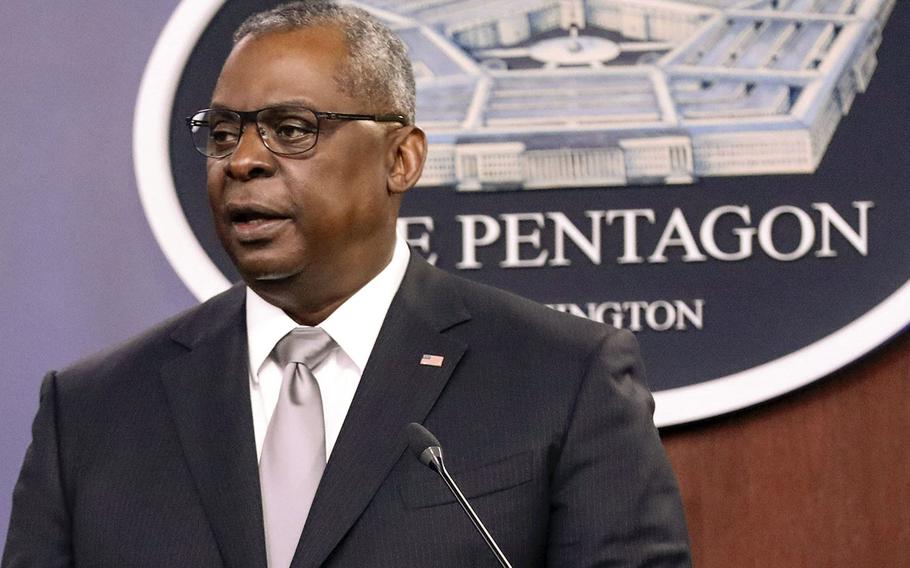
Defense Secretary Lloyd Austin speaks during a news briefing at the Pentagon on Feb. 19, 2021. (Caitlin M. Kenney/Stars and Stripes)
President Joe Biden ordered airstrikes Thursday evening against sites in Syria being used by Iranian-backed militant groups in the eastern portion of the war-torn nation, according to the Pentagon.
“These strikes were authorized in response to recent attacks against American and Coalition personnel in Iraq, and to ongoing threats to those personnel,” John Kirby, a Pentagon spokesman, said in a statement.
One militiaman was killed and a number of others were wounded in the airstrikes, an Iraqi militia official told The Associated Press on Friday.
The airstrikes destroyed multiple facilities at a border control point used by a number of Iranian-backed militant groups, including Kataib Hezbollah and Kataib Sayyid al-Shuhada, Kirby said.
The strikes were done after consultation with coalition partners, Kirby said.
“The operation sends an unambiguous message: President Biden will act to protect American and Coalition personnel,” he said. “At the same time, we have acted in a deliberate manner that aims to de-escalate the overall situation in both eastern Syria and Iraq.”
The strikes represent the administration’s first military action since Biden was sworn in last month.
The Pentagon did not disclose the type of weaponry used in the strike nor any other details as to its scope.
Defense Secretary Lloyd Austin said Thursday he had recommended the airstrikes to Biden, according to The Associated Press.
“We said a number of times that we will respond on our timeline,” Austin told reporters flying with him from California to Washington. "We wanted to be sure of the connectivity and we wanted to be sure that we had the right targets.”
Austin characterized the strike as a specific response to the rocket attack by militants earlier this month, not as an opening salvo in greater military involvement in the region.
“I’m confident in the target that we went after, we know what we hit,” Austin said. “We’re confident that that target was being used by the same Shia militants that conducted the strikes."
That Feb. 15 attack on an airport in the northern Iraqi city of Irbil killed a civilian contractor working with the American-led military coalition. Six others were wounded, including a U.S. service member. Other rockets landed in a residential area of the city.
On Monday, two Katyusha rockets fell near the U.S. Embassy in Baghdad, an attack attributed by the State Department to Iran, according to news reports. No injuries or deaths and only minor damage to a vehicle were reported.
The barrage was the third attack in a week on sites connected to the U.S., according to reports.
A year ago, Iran vowed retaliation for the U.S. drone strike that killed Qasem Soleimani, a top Iranian general.
Days after his death, Iran launched missile attacks against U.S. forces at an Iraqi air base in Anbar Province that wounded more than 100 troops.
Former President Donald Trump’s administration had ordered a drawdown of diplomats at the U.S. Embassy in Baghdad with the approach of the one-year anniversary of Soleimani’s death on Jan. 3 in anticipation of violent reprisal by Iran.
olson.wyatt@stripes.com Twitter: @WyattWOlson